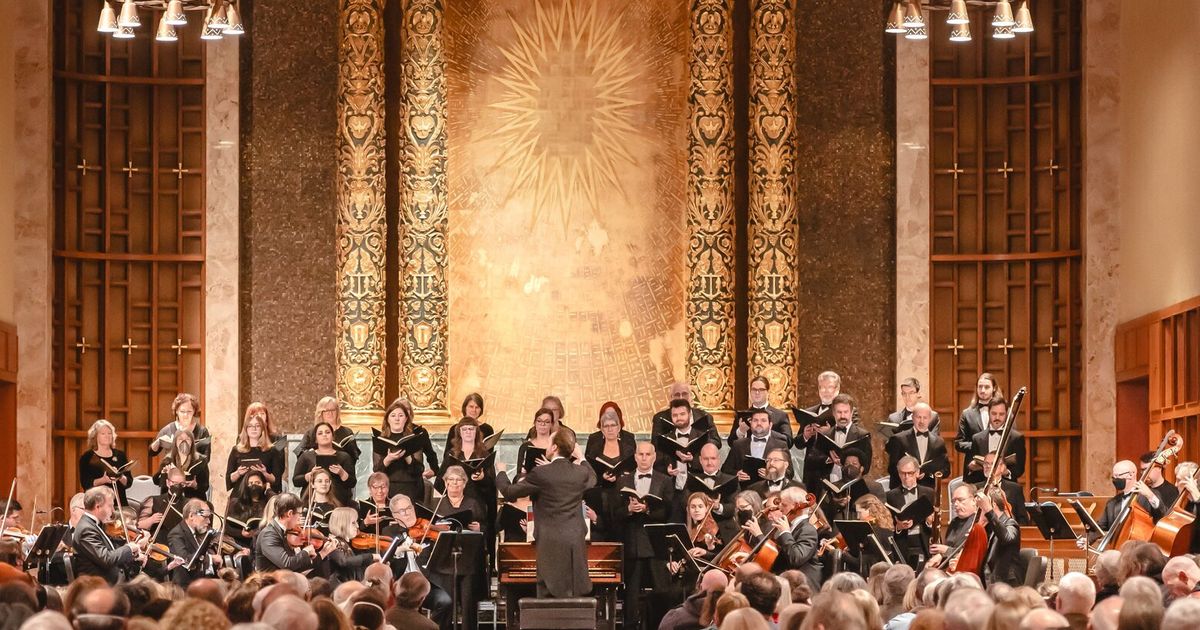Like Starbucks rolling out its festively colored holiday cups, performances of “Messiah” make an inevitable appearance each December. For many, it’s as much a part of the season as twinkling lights and the scent of pine.
But Seattle-based Harmonia, comprising a 70-member semiprofessional orchestra and 55-voice chorus, has forged a special relationship with George Frideric Handel’s classic that goes back to the very origins of this community-based ensemble some 50 years ago.
“For us, ‘Messiah’ isn’t just a routine piece whenever Christmas comes around again,” said William White, a conductor, composer and writer who became Harmonia’s music director in 2018. “Our members would revolt if there were any mention of not doing it. They really do latch onto this music.”
White will lead Harmonia in its annual performances of “Messiah” on Dec. 14 and 15 at First Free Methodist Church on Queen Anne and Bastyr University Chapel in Kenmore, respectively. The guest soloists include soprano Ellaina Lewis, mezzo-soprano Soon Cho, tenor Andrew Etherington and baritone José Rubio.
“I’ve participated in a lot of the other ‘Messiahs’ that take place in Seattle and can point out many of the technical aspects of what we do that set us apart,” said White. “But if you ask people in the group what defines Harmonia’s ‘Messiah,’ they would speak in the language of emotions.”
Handel’s musical narrative of the life, death and resurrection of Jesus takes the form of an oratorio — a large-scale dramatic work for soloists, chorus and orchestra that is operatic in scale but dispenses with costumes and sets. First performed in Dublin in 1742, “Messiah” had found its place as a cherished annual tradition by the end of the composer’s life in 1759.
“Messiah” is also deeply entwined with the core identity of Harmonia Orchestra & Chorus, as White renamed the organization in 2021. It had been founded in several stages by the late George Shangrow, beginning as a choral group in 1969. That was when Shangrow — a precocious senior at Roosevelt High School obsessed with Baroque music — banded together with friends at the University of Washington School of Music to form an ensemble he dubbed the Seattle Chamber Singers.
Already in 1970, Shangrow led them in a performance of choral excerpts from “Messiah.” He began presenting productions of the complete work in 1976 and, by the end of the decade, founded a permanent orchestral ensemble to partner with the chorus. Following a couple of name changes, the collective was known for many years as Orchestra Seattle/Seattle Chamber Singers.
OSSCS carved out a niche in the region’s music scene through vibrant renditions of monumental works of the choral repertoire, with a special focus on Bach and Handel. Shangrow, who became a local celebrity as a KING-FM radio host, also ardently championed new music and premiered dozens of works commissioned mostly from local composers. White has continued this bifocal programming, with premieres playing a prominent role alongside the familiar repertoire throughout the season.
“We were a cadre of friends, and ‘Messiah’ was one of our anchors,” recalled Laurie Medill, a member of the alto section since 1980 who helped Shangrow manage the ensemble. “George’s obvious, infectious joy for the piece would catch everyone up in its magic.”
In 2010, Shangrow, only 59 at the time, was killed in a car accident. But the traditions he established have endured — including some unique approaches to “Messiah.”
“We play every note from beginning to end, with no cuts,” said White. While most “Messiah” performances omit some numbers from the three-part oratorio, Harmonia’s complete version lasts some three-and-a-half hours (including two intermissions).
In most other circumstances, that might be a risky duration to expect of audiences — let alone performers — in a concert setting. “I was skeptical when I first came on board, because there were some choruses I myself had never heard before in live performance,” White recalled.
“But when I suggested making a couple of cuts, people reacted as if I had said something offensive. Now I can’t imagine doing it any other way. When we begin, I feel like one of those big wave surfers off the coast of Portugal that head out for 30-foot mega-waves and just ride along. There’s something so thrilling when you know the topography of the piece, the drama of its ups and downs.”
Shangrow also introduced the phenomenon of dueling harpsichords to the performances. While co-founding member and composer Robert Kechley played one harpsichord, contributing inspired improvisations as accompaniment to the singers, Shangrow joined in from a second harpsichord, leading the entire performance from the keyboard (as Handel would have done).
“They used to have running in-jokes about where they would play a kind of pingpong across the two harpsichords,” said White, who never got a chance to meet Shangrow. “Overall, I have found that George’s rendition of ‘Messiah’ is also very fun.”
These days, White continues the dueling harpsichords tradition with Harmonia colleague Sheila Bristow at the other harpsichord.
“The institutional knowledge and love for the work that we garnered over George’s 40 years at the podium have only grown,” says Medill. White meanwhile brings to his performances “the same brilliant knowledge of ‘Messiah’ and the same earnest love of making music with friends that George had. So the tradition has continued to flourish in the best possible way.”
Correction: This story has been updated with the correct list of guest soloists.

